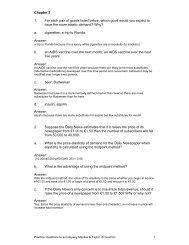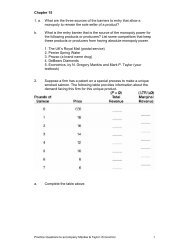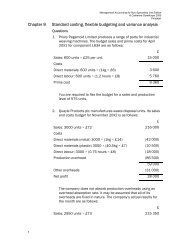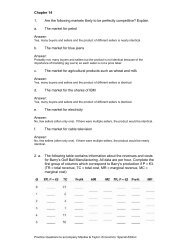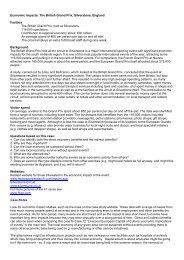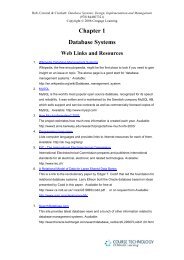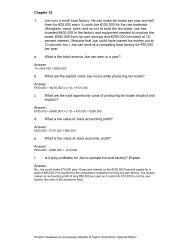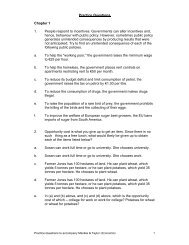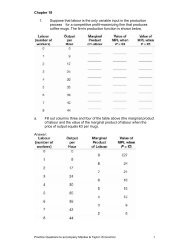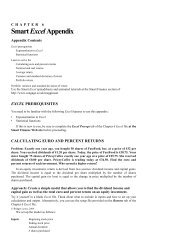Answer - Cengage Learning
Answer - Cengage Learning
Answer - Cengage Learning
Create successful ePaper yourself
Turn your PDF publications into a flip-book with our unique Google optimized e-Paper software.
3. Private companies have been providing broadcast radio television and radio since theinvention of the medium. How do they make it profitable if they cannot charge the recipientof the signal?<strong>Answer</strong>: Broadcasters charge advertisers for the commercials they show during thebroadcasters’ programming. That is why it is called commercial television or commercialradio.4. What are the "recent" alternatives to traditional commercial television and commercialradio?<strong>Answer</strong>: Cable television, pay-per-view television, and cable music included with cabletelevision.Chapter 12You are having a political debate with a friend. The discussion centres on taxation. Youshow your friend some data from your economics textbook that suggests that the averagecitizen paid about €10,000 in tax in 2005. Your friend says, "If €10,000 per person is whatit takes to run this country, then I think that it would be much simpler if we just billed eachcitizen €10,000 and eliminated the complex tax system."1. What type of tax is your friend suggesting? What is its appeal?<strong>Answer</strong>: Lump-sum tax. It is the most efficient tax—its marginal rate is zero so it does notdistort incentives, and it imposes the minimum administrative burden.2. Is this type of tax supported by the "benefits principle" of tax equity? Explain.<strong>Answer</strong>: No, if some people benefit more from public services such as health care, policeand education, they should pay more in taxes, and those who benefit less should pay less.3. Is this type of tax supported by the "ability-to-pay" principle of tax equity? Is it verticallyequitable? Is it horizontally equitable?<strong>Answer</strong>: No, wealthy people have a greater ability to pay. Therefore, it is not verticallyequitable. However, it is horizontally equitable in that people with the same ability to payare paying the same amount because all pay the same amount.4. Since your friend agrees that the tax she suggested is not equitable, she now suggeststhat we simply tax rich corporations since they can clearly afford it and then peoplewouldn't have to pay any taxes. Is she correct? Who would actually pay the taxes? Explainhow she mistakenly employed the flypaper theory of taxation.<strong>Answer</strong>: No, only people pay taxes—corporations collect taxes. The taxes are paid by theowners, workers, and customers of the corporations. The flypaper theory of taxationmistakenly says that burden of a tax is on the person or company from whom the taxesare collected.Chapter 13




